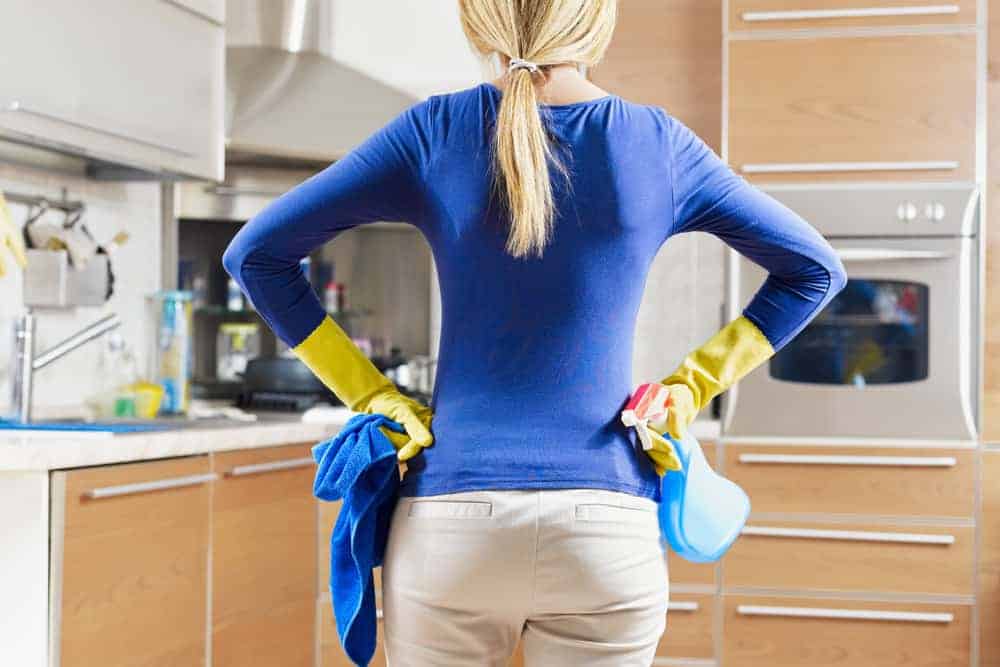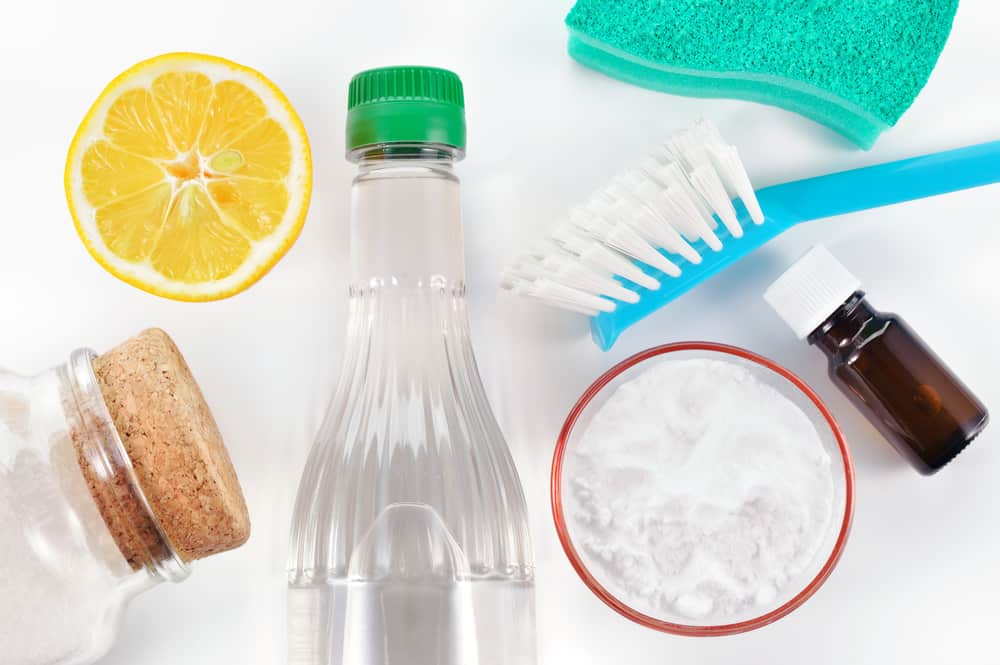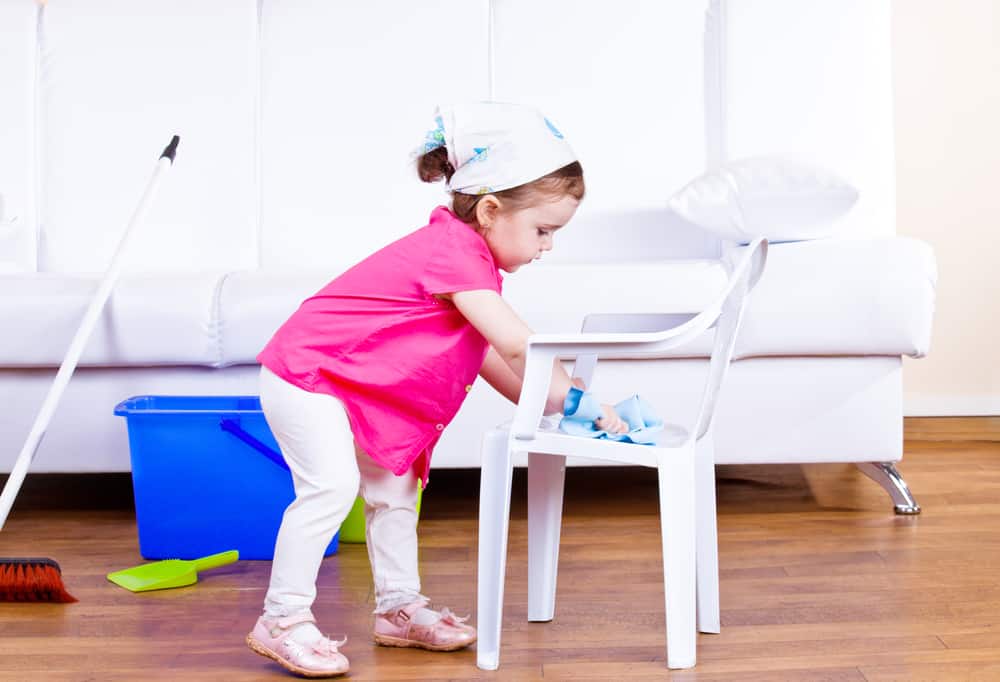
Photo: Deposit Photos
Clean often
It might sound backward, but cleaning more often actually saves you time and cash. A quick swipe with a soapy cloth can tackle a fresh spill on the stove, but let it sit until it’s a crusty mess, and you’ll need heavy-duty cleaners and elbow grease. This applies to almost everything: soap scum in the tub, crumbs in the carpet, stains on fabric, or dust on furniture and blinds. Fresh messes wipe away easily with minimal effort and basic supplies.
One exception? Mud on carpets or upholstery. Attack it wet, and you’ll grind it deeper into the fibers. Let it dry first, vacuum up the loose dirt, then treat the leftover stain with a damp cloth.
Stick to a weekly cleaning routine—or even quick daily touch-ups—and a damp cloth often does the trick. You’ll use fewer expensive products, leaving more money for things you enjoy.
Purchase good-quality cleaning supplies
Skip the flimsy, cheap stuff that breaks after two uses. I used to grab my cleaning tools from hardware or janitorial supply stores—think sturdy brooms, flat mops, and real ostrich feather dusters. That was ages ago, and I’m still using the same ones! Good-quality tools are comfortable and effective and save you from constantly replacing junk.
Don’t fall for gimmicky features that jack up the price. A simple mop, broom, dustpan, window squeegee, cleaning bucket, spray bottles, and stack of folded cloths will handle most jobs.
Bonus tip: To stretch your dollar further, look for tools with replaceable parts, like a mop with a washable head.

Dispose of the disposables
Want cheap house cleaning? Stop buying things you’ll just toss out. Swap paper towels for reusable rags—wash them between uses and you’re set. Pick a mop that doesn’t need pricey disposable pads. Love your Swiffer? Skip the refills. Grab a pair of stretchy chenille socks (a couple bucks at most), slip one over the head, and use it with a vinegar spray for wet mopping. Flip to a dry sock to polish it off.
If you sew, whip up some cute reusable covers for even more savings.
Buy a lightweight vacuum cleaner that you can afford
I’ve tried many vacuums, and my rule is simple: It has to be light enough to lift without a hernia and cheap enough to buy without a loan. Heavy vacuums sit unused, and financed ones? Nope. Even budget models now come with HEPA filters and solid suction.
Check reviews, buy what fits your wallet, and save up for that dream machine later.
Pro tip: Empty the canister or change the bag regularly—full vacuums lose power and leave dirt behind.
Edit your cleaning supplies
You don’t need a fancy cleaner for every surface. A no-rinse, all-purpose cleaner handles counters, bathroom fixtures, and tile floors just fine. If you want it to disinfect, check the label—most need to stay wet on the surface for a few minutes (often 10) to kill germs.
For frugal cleaning supplies, stick to the essentials: an all-purpose cleaner, vinegar, baking soda, and maybe a glass cleaner. Edit out the rest—you’ll save money and cabinet space.
If you want to limit your cleaning product collection to a few key items, these cleaners are on our must-have list.

Photo: Deposit Photos
Swap store-bought for DIY homemade cleaners
Don’t waste your money on store-bought cleaners that don’t always work as well as you’d like. It’s cheaper to make your own cleaning supplies from ingredients you likely already have on hand.
Store-bought cleaners can be a rip-off, and half the time they don’t even work. Raid your pantry instead. Mix equal parts water and white distilled vinegar in a spray bottle for an all-purpose cleaner that shines windows, stainless steel, and chrome. Wipe it off with a lint-free cloth, and you’re golden. It even deodorizes smelly lunch boxes.
Use undiluted vinegar for greasy stovetops, oven doors, or cloudy shower glass. Tackle stains or baked-on gunk with baking soda and a wet sponge. Together, vinegar and baking soda unclog drains and freshen toilets. Borax is your friend for scrubbing sinks and tubs.
Need glass cleaner? Mix a tablespoon of ammonia or two tablespoons of vinegar with a quart of water—beats the blue stuff every time.
My favorite mirror trick? Hot water alone—it melts away hairspray and toothpaste splatters for free.
Shop smartly for store-bought cleaners.
When you buy cleaners, cheap cleaning supplies often match the pricey ones. Compare ingredients—generic or store brands are usually identical to the big names you see on TV.
Hunting for a deal? Check weekly ads or online for coupons to dodge full price.
Bonus tip: Buy in bulk when it’s on sale, but only if you’ll use it—half-used bottles gathering dust aren’t savings.

Store cleaning products in cool, dark places
Heat and light can weaken cleaners or even make them hazardous. Keep them in a cool, dark spot—under the sink or in a closet. If you’ve got kids or pets, stash them high and secure.
Another money-saver: Store everything in one place. I used to find three half-empty bottles of the same thing scattered around my house—such a waste! Centralize your stash, and you won’t repurchase what you already own.
Just keep bleach and ammonia far apart—mixing them (or storing them close) can release toxic fumes.
A minimalist lifestyle for minimal cleaning
Less stuff equals less cleaning—it’s that simple. It goes without saying if you have a smaller home or less stuff, you’ll have less to clean – saving you time and money on cleaning needs.
Do you need all those knickknacks that require dusting or rugs that need vacuuming? Simplifying your life will also simplify your cleaning routine.
Plus, if you get rid of your stuff at a garage sale, you can earn some money to put back into your dream vacuum fund.
These tips for house cleaning prove you don’t need a big budget to keep things spotless. Whether you’re after quick home cleaning tips, easy house cleaning tips, or economical home cleaning supplies, it’s all about working smarter. Stick to frugal cleaning tips like these, and you’ll master cheap house cleaning without breaking a sweat.
For more house cleaning tips and tricks—or easy tips and tricks to get your home clean—keep it simple and skip the hype. Your wallet (and your sparkling home) will thank you!
If you liked this post, you might also like:

Preach it Carolyn :-)
Expensive cleaners are almost never needed if you clean as you say. Bonus, it is better for the environment. I find those microfiber cloths are super for dusting and cleaning glass with just water. Hard to get cheaper than that and now a days you can get them even at the dollar tree 2 for a dollar and they hold up rather well. I also like using baking soda instead of those chemical and bleach filled powders.
Distilled white vinegar is cheap by the gallon. In a spray bottle with water, it cleans everything and kills bacteria. Good for cleaning the kitchen, the bathroom, windows, and floors of all types because it dries so fast. (I use on laminate floors and vinyl floors.) Vinegar smell dissipates totally and very fast. Good in the laundry as a fabric softener, too.